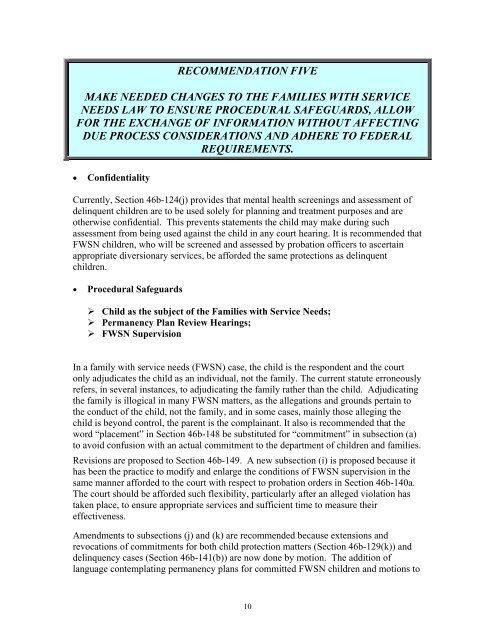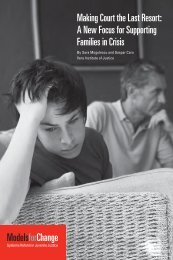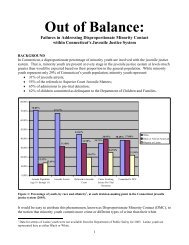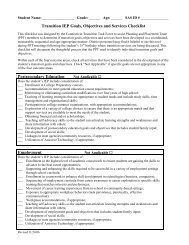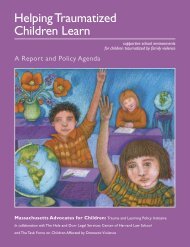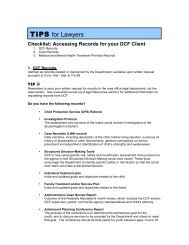FWSN-advisorybd-repo.. - The Connecticut Juvenile Justice Alliance
FWSN-advisorybd-repo.. - The Connecticut Juvenile Justice Alliance
FWSN-advisorybd-repo.. - The Connecticut Juvenile Justice Alliance
Create successful ePaper yourself
Turn your PDF publications into a flip-book with our unique Google optimized e-Paper software.
RECOMMENDATION FIVE<br />
MAKE NEEDED CHANGES TO THE FAMILIES WITH SERVICE<br />
NEEDS LAW TO ENSURE PROCEDURAL SAFEGUARDS, ALLOW<br />
FOR THE EXCHANGE OF INFORMATION WITHOUT AFFECTING<br />
DUE PROCESS CONSIDERATIONS AND ADHERE TO FEDERAL<br />
REQUIREMENTS.<br />
• Confidentiality<br />
Currently, Section 46b-124(j) provides that mental health screenings and assessment of<br />
delinquent children are to be used solely for planning and treatment purposes and are<br />
otherwise confidential. This prevents statements the child may make during such<br />
assessment from being used against the child in any court hearing. It is recommended that<br />
<strong>FWSN</strong> children, who will be screened and assessed by probation officers to ascertain<br />
appropriate diversionary services, be afforded the same protections as delinquent<br />
children.<br />
• Procedural Safeguards<br />
‣ Child as the subject of the Families with Service Needs;<br />
‣ Permanency Plan Review Hearings;<br />
‣ <strong>FWSN</strong> Supervision<br />
In a family with service needs (<strong>FWSN</strong>) case, the child is the respondent and the court<br />
only adjudicates the child as an individual, not the family. <strong>The</strong> current statute erroneously<br />
refers, in several instances, to adjudicating the family rather than the child. Adjudicating<br />
the family is illogical in many <strong>FWSN</strong> matters, as the allegations and grounds pertain to<br />
the conduct of the child, not the family, and in some cases, mainly those alleging the<br />
child is beyond control, the parent is the complainant. It also is recommended that the<br />
word “placement” in Section 46b-148 be substituted for “commitment” in subsection (a)<br />
to avoid confusion with an actual commitment to the department of children and families.<br />
Revisions are proposed to Section 46b-149. A new subsection (i) is proposed because it<br />
has been the practice to modify and enlarge the conditions of <strong>FWSN</strong> supervision in the<br />
same manner afforded to the court with respect to probation orders in Section 46b-140a.<br />
<strong>The</strong> court should be afforded such flexibility, particularly after an alleged violation has<br />
taken place, to ensure appropriate services and sufficient time to measure their<br />
effectiveness.<br />
Amendments to subsections (j) and (k) are recommended because extensions and<br />
revocations of commitments for both child protection matters (Section 46b-129(k)) and<br />
delinquency cases (Section 46b-141(b)) are now done by motion. <strong>The</strong> addition of<br />
language contemplating permanency plans for committed <strong>FWSN</strong> children and motions to<br />
10


